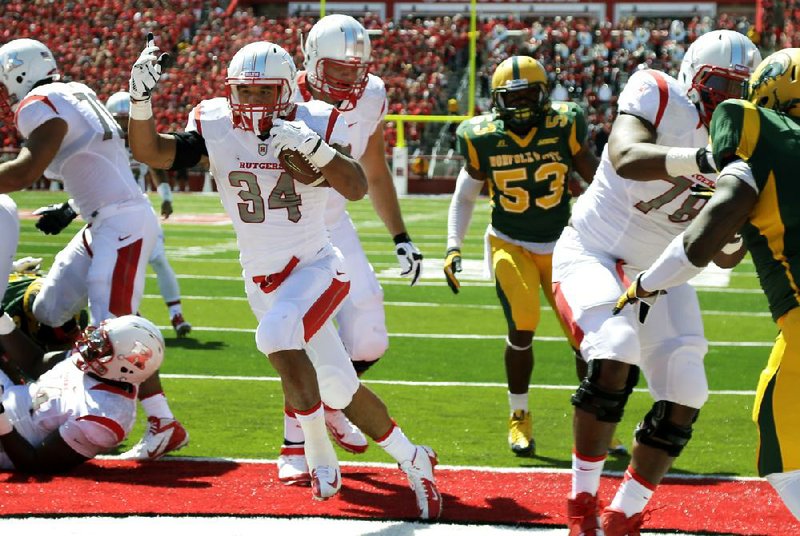PISCATAWAY, N.J. - Just two years ago, Paul James couldn’t get a single Division I football program to notice him.
He spent college signing day in 2011 sitting in class at Glassboro High School in southern New Jersey. His coaches worked the phones, hoping for a late break, but the fax machine stayed silent.
“It really hit me,” James said. “Like, ‘Wow, I have nothing going for me.’ ”
More than four dozen other football prospects fromNew Jersey signed letters of intent that day, a glut of statewide talent that included running back Savon Huggins, who signed with Rutgers.
Rutgers officials told James he was welcome to walk on.
James took them up on their offer. Now he has replaced Huggins as the starting running back and, after three games, leads the nation with 493 yards, an average of 8.1 yards per carry, heading into today’s game against Arkansas at High Point Solutions Stadium.
James will receive the bulk of the carries, but he isn’t the team’s only walk-on. Michael Burton, a walk-on fullback, will be blocking for him, making up what Rutgers believes to be the only nonscholarship starting backfield for a major college in the country.
“It just shows what we overcame,” James said. “We both came in as walk-ons, and it shows how strong we are to get to this point and how hard we have to work to keep it as is.”
Burton grew up in Long Valley, N.J., as a die-hard Rutgers fan, attending summer camps on campus as a high school junior and senior. But as an oversized, 220-pound running back, colleges seemed hesitant. He said he had offers from lower-tier programs like Towson, New Hampshire and Maine, but only marginal recruiting interest from his top choice, Rutgers.
Instead, like James, he was extended a lukewarm invitation to walk on.
“There are never any guarantees in life,” said Burton, a redshirt junior. “You have to prove yourself every single day.”
James and Burton were “preferred” walk-ons, prospects that the coaching staff noticed and liked but did not offer scholarships. It is not the lowest rung on the college sports ladder, but the ground is mighty close.
Burton and James began as practice pawns and members of the scout team, lining up often against the first-team defense and mimicking what another team might run. They were in the dredges of the team’s depth chart, but eventually the coaching staff took notice.
“We don’t really talk about being walk-ons,” Burton said.“We’re out there trying to win games.”
So how did so many programs miss the speedy James, who has six touchdowns in three games?
“Different players end up in different situations for different reasons,” Rutgers Coach Kyle Flood said. “From what I understand, he had some injury issues his senior year of high school. I think when coaches see that, they are probably less likely to invest a scholarship at that point in a player.”
James suffered a high-ankle sprain in the third quarter of the first game of his senior year after rushing for 1,730 yards for tiny Glassboro as a junior. Colleges had begun to show interest - Tulane, Marshall, East Carolina, Templeand even Penn State, James’ top choice - but the ankle injury the next season halted his momentum.
He missed two games, then began losing playing time to Corey Clement, a talented junior who wound up committing to Wisconsin.
“As his senior year kind of ticked away, a lot of those other schools wound up kind of falling off,” said Greg Maccarone, the offensive coordinator at Glassboro.
Two lower-tier programs, Delaware and James Madison, remained interested in James as a defensive player, and Marshall and East Carolina gave him offers that quickly expired. He hedged, and both scholarships were filled.
So, James waited until he couldn’t wait any longer. He began calling colleges and sending tapes, mining for a glimmer of interest. He visited the team closest to home, Temple, as well as Rutgers in May.
Greg Schiano, then the coach of the Scarlet Knights, told him he could show up in June and have a roster spot, but nothing else was guaranteed.
“I could either look at it as an insult or an opportunity to grab,” James said. “I could get in here and work my way up the food chain and get to where we want to be.”
James said he understood the doubts, but he didn’t have any.
“If you’re a walk-on, if you don’t have a scholarship, if you weren’t highly recruited, that’s how people look at you. They’ll doubt you,” he said. “You just can’t let that get to you.”
Sports, Pages 19 on 09/21/2013

